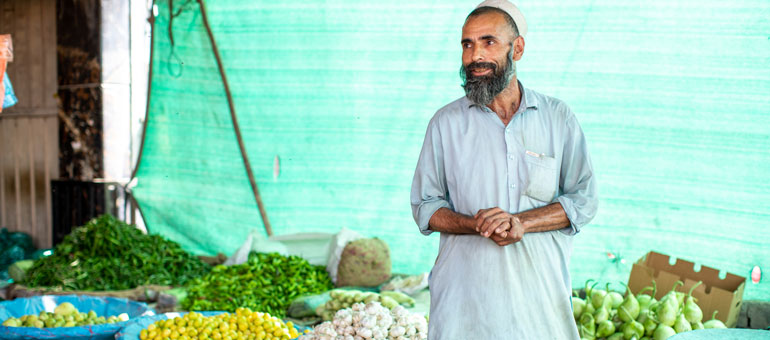The pressing need to improve environmental sustainability and resilience became manifest in Pakistan in 2022, when severe floods destroyed crops across two-thirds of the country’s food basket, contributing to surging food prices, lost incomes, and increased poverty and driving over 14 million people to be in need of emergency food assistance. The lower-middle income country has contributed very little to global climate change – Pakistan is responsible for 0.28% of historical greenhouse gas (GHG) emissions, compared to 25% for the US, the largest historical emitter. Yet it is strongly feeling the effects, making it essential to not only build resilience but also increase environmental sustainability across all sectors of the country’s economy.
The agri-food sector can play a key role in doing so: 41% of Pakistan’s GHG emissions come from agriculture, which is also a major source of local water and air pollution. This is partly due to inefficient production: producing a kilogram of food in Pakistan generally requires more resources, emissions, and waste than producing a kilogram of food in a high-income country. Finding more efficient uses of resources and reducing waste can decrease the overall environmental footprint of the food sector.
One prime area for doing so is the dairy sector: Pakistan is the fourth-largest dairy producer in the world, producing nearly 62 billion litres a year. Yet produced alongside this impressive production volume is a large amount of waste, particularly of whey, the watery part of milk that remains when the curd is removed for making cheese: producing 1 kg of cheese results in 9 kg of whey. Globally, about half of this is disposed in wastewater. Whey has a high content of organic matter and nutrients, which can cause serious damage to local ecosystems; safe disposal requires expensive and complex sewage treatments. Finding creative ways to use whey, instead of disposing it, can thus play an important role in increasing environmental sustainability.

A new GAIN partnership funded by Danida Market Development Partnerships aims to change that and to increase the acceptability and availability of safe, nutritious dairy products. © GAIN
It can also play a role in addressing malnutrition: whey contains high nutrient content, including proteins, vitamins, and minerals. These are sorely needed to improve diets in Pakistan, where 17% of the population is undernourished and only 15% of young children and 54% of women eat diets of minimal diversity. Currently, most of Pakistan’s low-income population cannot afford milk – indeed, nearly half of Pakistani households are unable to meet their nutritional needs due to poverty. Yet while whey has become an important ingredient in high-quality foods worldwide, its use remains underdeveloped in Pakistan.
A new GAIN partnership funded by Danida Market Development Partnerships aims to change that and to increase the acceptability and availability of safe, nutritious dairy products. It will collaborate with local businesses to develop a nutritious whey-based drink, affordable to low-income Pakistani consumers and economically viable for businesses. Local partner dairies in Punjab and Khyber Pakhtunkhwa who are interested in collaborating—and have sufficient excess whey production - will be invited to participate in a co-creation process that adapts the general whey-based product concept to dairies’ specific production set-up and capacity.
In collaboration with global partners, such as Arla Food Ingredients, bespoke recipes adapted to the local market, and enriched with additional micronutrients to fill dietary gaps, will be developed. Given rising challenges with diet-related non-communicable diseases like diabetes in Pakistan, only a small amount of sugar (5% or less, in line with WHO recommendations) should be added – necessitating innovative solutions like using lactase to enhance sweetness without adding sugar. To make sure the product can benefit those who need it most, partners are also exploring potential linkages with school meal and emergency relief programmes.
Through this collaboration, fusing local knowhow with cutting-edge expertise in food technology, GAIN and partners aim to transform waste into a win-win-win for nutrition, environmental sustainability, and local business growth.